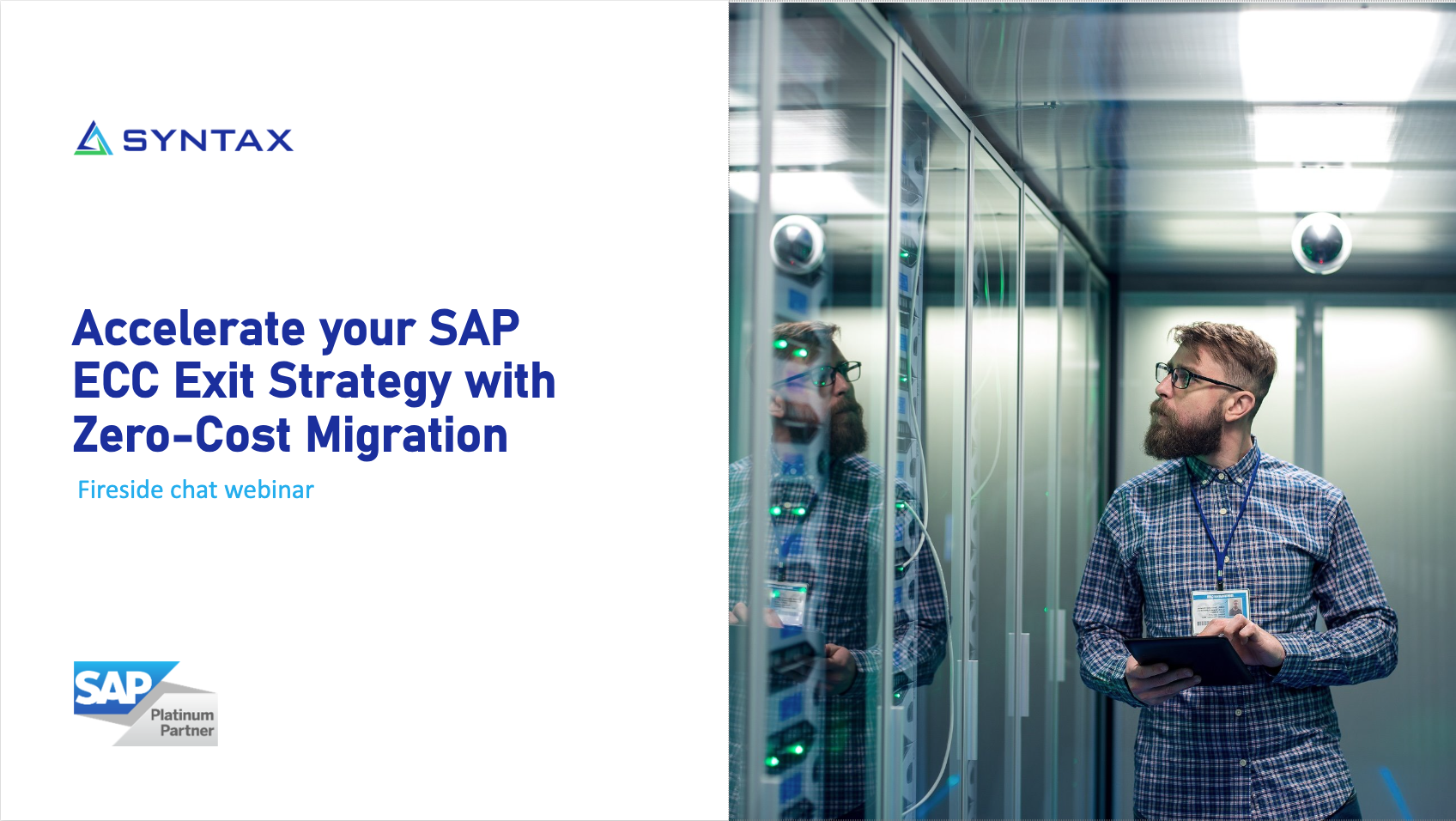Still on SAP ECC? You’re not alone—2025 Gartner Analyst Research estimates that as of Q4 2024, around 61% of SAP ECC customers had yet to license any version of SAP Cloud ERP, formerly called SAP S/4 HANA. But the clock is ticking.
With support ending in 2027, it’s time to get serious about your migration plan. Having a formal strategy puts you in the driver’s seat heading towards innovation and accolades, while putting it off could mean headaches and higher costs later for your organization. No one wants to be caught scrambling last-minute.
Why the wait? While many organizations understand the importance of migration, some have hesitated due to the perceived complexity, costs, and potential business impact. Completely understandable. There is a cost. There is risk. But there are also tradeoffs to delaying that may only exacerbate these challenges.
Let’s walk through and break down some common objections as well as the benefits of migrating to SAP ERP Cloud. We will then look at some ways to streamline your migration and mitigate the perceived challenges.
Four Objections and Challenges Commonly Encountered When Planning an SAP ECC Migration
The benefits of migrating to SAP ERP Cloud are being touted from multiple channels, but challenges and objections can still cause friction when trying to plan and execute. It’s important to keep both short-term and long-term strategies in mind as you begin the planning process.
1. How will we manage and justify the cost and time commitments
One of the biggest questions raised by organizations is, “How much will this cost, and how long will it take?” Migration is certainly an investment, full stop. Partner programs and SAP provided incentives are in place to reduce and minimize financial spend. Migration tools and AI can help offset the time and effort expense. If you aren’t discussing cost and effort offsets and efficiencies, then you should be. This is why advanced planning and the right partner are so essential.
2. We don’t have the skills and resources to execute a migration or to support a new system going forward
Having the right resources and skills is an important concern. Organizations should assess their current team’s readiness and plan for additional training or upskilling, as needed. A trusted partner like Syntax can provide advisory services, technical expertise, and ongoing support to bridge these gaps and ensure a successful migration. Regarding ongoing system use and support, most organizations find the upgraded environments are easier to operate and maintain. They were designed with usability and experience in mind and the learning curve moving from SAP ECC to SAP Cloud ERP is minimal.
3. What about the impact on the business
There will be an impact on the business. There’s no way around it. Even if there isn’t any downtime or interruption to work, there will still be a different system and user experience to introduce. This is why planning and stakeholder engagement are critical. By involving business and IT teams early in the process, organizations can align goals, identify risks, and develop a plan that minimizes downtime. Thorough testing and training also ensure a smoother transition and better user adoption. Put a positive spin on the impact—the overall outcome will be of benefit to everyone.
4. We aren’t prepared to “modernize” across the board; it runs fine the way it is
This is a common concern, and the good news is you don’t have to modernize everything at once. A thoughtful, intentional migration to SAP Cloud ERP lets you keep what’s working while gradually unlocking new capabilities where they matter most. It’s about making smart moves on your own timeline and not disrupting your business.
Beyond the core ERP system, organizations must consider how surrounding systems, processes, and data will integrate into the new environment. This holistic approach ensures that your entire technology landscape is aligned, efficient, and ready for future innovation.
The Benefits of Migrating to SAP Cloud ERP
Need some convincing to begin exploring migration? Here are five considerations and benefits for SAP ECC customers to keep in mind as they begin planning their migration strategy:
1. Ensuring a fully supported technology landscape
The end of mainstream maintenance in 2027 means no more updates, patches, or new functionality for SAP ECC. Unsupported systems expose organizations to increased risks, such as security vulnerabilities, regulatory non-compliance, and operational inefficiencies. Getting ready early allows organizations to mitigate these risks and transition smoothly to a supported, modern SAP Cloud ERP application.
2. Planning ahead helps control costs and maximize an intentional ROI
Prior planning provides more control over migration costs by allowing organizations to spread expenses over a longer period and take advantage of incentives from SAP and migration partners such as Syntax. It also ensures organizations can strategically evaluate ROI and align their SAP Cloud ERP migration approach with long-term business goals.
3. Mapping out your migration can help minimize business disruption
A successful SAP migration requires planning, testing, and training. Mapping it out now will allow your organization to identify and mitigate potential roadblocks, minimize downtime, and ensure that the transition is as smooth as possible. This approach also fosters better user adoption, which is critical for realizing the benefits of the new system.
4. Creating a future-proof technology landscape
By migrating to SAP’s modern ERP solutions, organizations can adopt a clean-core strategy, stay compliant with evolving standards, and prepare for continuous updates and improvements. This future-proofing ensures organizations can adapt quickly to market changes, new technologies, and evolving customer demands.
5. Leveraging advanced capabilities and innovations
Moving to SAP Cloud ERP unlocks access to SAP’s latest technologies including advanced analytics, real-time data processing, and AI-driven automation. These capabilities enable organizations to optimize processes, make smarter decisions, and stay competitive in an evolving market. In 18-24 months, organizations that adopted AI and automation may pull ahead of those that did not. Prepare now so that your organization can be on the right side of the equation when this happens.
How Syntax Simplifies the SAP Migration Journey
SAP Cloud ERP Migration Services
At Syntax, we understand the complexities of migration. Our FreeMigration+ program is designed to make the transition to SAP Cloud ERP Private as seamless and cost-effective as possible, offering:
- Advisory Services: Expert guidance to help you evaluate your current environment, define your migration approach, and develop a tailored roadmap.
- AI-Powered Tools: Access to solutions like Syntax CodeGenie, which documents custom code and accelerates migration preparation, and Syntax CxLink, which streamlines document management and data archiving to reduce migration complexity.
- Zero-Cost Brownfield Migration: No cost for the core technical migration, allowing you to focus resources on business transformation and value-driven initiatives. Brownfield migration involves upgrading an existing ERP system by retaining its core processes, configurations, and data while transitioning to a new platform.
- Ongoing Support: From initial planning to Day Two operations, Syntax provides comprehensive support to ensure your migration is successful—and your organization continues to thrive.
With our zero-cost, low-risk migration and AI-enabled path to SAP ERP clean core, Syntax FreeMigration+ eliminates the roadblocks, empowering organizations to unlock the full potential of the cloud faster. Clean core keeps the core ERP system standard and unmodified, using cloud extensions for customizations to ensure easier updates, compliance, and future innovation.
What’s Next: SAP Managed Services
Syntax understands that the migration journey doesn’t end at implementation. Through SAP managed services, organizations benefit from day-two operations support, including release management, change management, and continuous optimization.
Syntax’s managed services empower organizations with:
- Expertise in operational support post-migration
- Assistance in setting up centers of excellence for upgrades and new releases
- Ongoing user training to ensure high adoption rates and operational success
This continuous improvement mindset ensures organizations remain competitive and adaptable to evolving market dynamics.
The Time to Migrate Is Now
Don’t wait for the 2027 deadline to catch up; begin your transition to SAP Cloud ERP Private today. Syntax FreeMigration+ offers a structured, zero-cost solution to future-proof your ERP system, reduce technical debt, and drive operational excellence.
Discover the range of Syntax’s SAP migration services and kickstart your SAP Cloud ERP migration journey.
Authors

Rebecca Murray
Vice President, Global Alliance Management, Syntax
Rebecca is Vice President at Syntax and a recognized expert in cloud technology and workforce solutions. She has a strong technical background, a passion for emerging technologies, and a business-focused mindset. Rebecca holds an undergraduate degree in Computer Engineering from Georgia Tech and an advanced degree in Business Administration.


